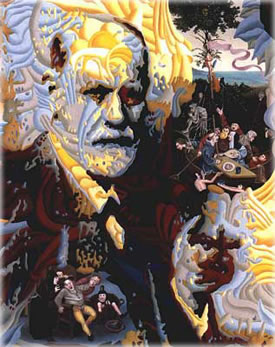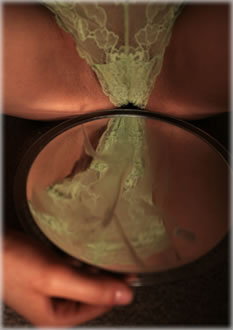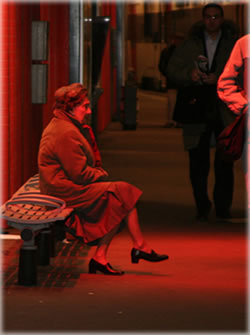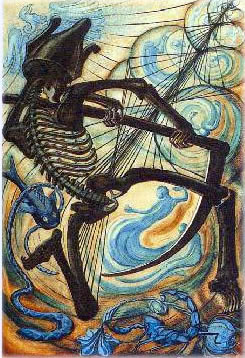
| March 10, 2008 | Introduction | Part I | Part II | Part III | Part IV | Part V | Link to This Subscribe to this series. Sex Changes Everything
The 5th and 8th Houses of Astrology That's the way it's been in town ever since they tore the jukebox down. --The Grateful Dead, "Row Jimmy" IF YOU were going to go somewhere to experience sex, would you choose an art studio or a bank? Personally, I think the art studio would be the more inviting place. Bright light streaming in through tall windows, canvases leaning against the walls, an old couch -- a feeling of devotion to timeless beauty, creation and adventure.
Though an art studio and a bank represent physical environments, they contain symbolic references. Art studios are about experiments and creative activities; they are about creating something new and perceiving the world in a fresh way. Artists teach us to see, and often, how to feel. Their creative results are put on public display. Banks are about commitments, obligations, and most of the business that is transacted is secret. Translated into astrology, when it comes to sex, we have a choice between the 5th house and the 8th house, respectively. They are the houses most frequently assigned by Western astrologers to cover the themes of sex. You can find attributes of nearly any theme in any house, but some houses are prominent on special subjects. The 5th and the 8th qualify. They give us two distinctly different visions of eroticism, which the world -- in its profound devotion to confusion and ignorance about sex -- tends to blur. In that blurring, we lose some meaningful distinctions, including the idea that there are worldviews associated with these two distinct houses, and that the worldview is invoked by where and how we choose to explore erotic communion. What are our expectations? What terms do we set? What is the intention of the sexual encounter? Let's take a trip through these two houses and see what we learn. But first, let's begin with a little background. What is a House? Physically, a house is a direction in space, relative to the Earth. As the world turns, the stars, planets and signs move through the houses. In the Northern Hemisphere, the 1st house is toward the east, the 7th house is toward the west, and so on. This does not change with the time of day; the 7th house is always in the west, no matter what the position of the heavens beyond. Appropriately, thematic content of a house will be something practical and worldly. Houses represent different environments on Earth. They represent contexts. They also represent groups of themes. Think of them as the stages where the dramas and intrigues of life are played out; these can be theatrical stages, and also growth stages. At any time, you should be able to identify what house you are in.
Information about how a particular house works comes from, among other things, the sign of the zodiac associated with a particular house in that chart, the planet associated with the at sign (i.e., in the case of Sagittarius, Jupiter) plus planets and other bits located in the house. Houses all involve what I call confluences of themes, which gather and mutate over time. These may or may not seem to add up when you first run through the offerings of a given house. Considering the groups of themes that each house includes, we have ways to see the connections between seemingly disparate events of a house. I'll use the 3rd house as an example. In ancient astrology, it's considered the "house of brethren." If we go to the first astrology book published in the English language (in 1647) by a man named William Lilly, we can see why; it's all about your siblings. Today, the 3rd house also includes writing, communications media, ideas, technology and thought itself. Lilly gives a list of questions you would typically assign to 3rd house themes. These include: If the querent and his brother, neighbor or sister shall agree; questions about a brother who is absent; if reports, intelligence or fears are true or false, and whether they signify good or evil; of counsel or advice, whether it's good or evil; and so on. Note, the querent is one making an inquiry of an astrologer. We have the image here of siblings living in the same neighborhood, of news getting around, and of asking advice of someone in your community and needing to assess the veracity of that advice. This is where things stood in 1647. As time goes on and new inventions or social conventions develop, they get assigned to one or more of the 12 houses. Today in the 3rd house, we include communications of all sorts, plus the technology that supports it. A computer used to send an email is an extension of the quill pen once used to write a letter to someone across town; both are devices of the 3rd house. For most contemporary astrologers, the 3rd house includes the childhood environment, since it's the time when language is learned, when siblings come into the world, and when we begin our relationships to them. This includes the local environment of childhood, that is, who and what you might bump into when crawling or toddling around. One of the ways you can exercise your understanding of a house is to consider the relationship between the themes involved. Neighbors talk to one another frequently. Siblings teach one another language and how to think; we work out a lot of mysteries of life with our sibs, and I think we have some of the most intense fun of our lives in their presence. Brothers and sisters play in shared homes or a common neighborhood and often live locally. In this local environment, ideas are exchanged, and advice is sought, given and received. At least on this level, it's a fairly easy house to understand, as they come. One important thing to remember about a house is that it changes definitions over time. Sometimes it is astrology that changes, seeing tings a different way. An author writes an article or book that gives a certain theme to a house, and the concept sticks. Sometimes it is the world that changes, with culture emphasizing existing themes in different ways. For example, in a time when very few people could actually move up in the world, the 10th house pertained mostly to high office, the king and the movements of the government. Professional activities were covered, but now that the world is emphasizing this aspect of life and so many people have a goal of moving up in the world, more people have access to 10th house subject matter. It is a much busier house than it used to be -- and this happens from time to time. We are about to see an exceptionally good example. Now let's consider two of the houses associated with sex by Western astrologers. Fucking for Fun: of Children, Gambling and Art ONE HOUSE commonly associated with sex is the 5th house. If we look to William Lilly, this house mainly involves questions of children and pregnancy, such as conception and birth, or whether someone is pregnant. Pregnancy and children come from sex, so it's easy to see how modern astrologers made that connection; Lilly and his predecessors did not, specifically. Remember, though, that after 1700 years of Christian rule, very nearly any real discussion or display of sexuality had been suppressed by the time his book came out. The Crusades had come and gone, leaving many women dead, nearly all of them accused of some form of sex (in the guise of witchcraft). Therefore, sex was not a topic of public discourse in Lilly's day; rather, unlike many, many previous times, sex and sexuality were strictly taboo -- a topic we'll return to when we get to the 8th house.
The theme of dad's money calls for some clarification. Lilly considered the 4th house the house of fathers, which idea was built on established ancient tradition. The 2nd house is the house of wealth, so the "2nd house of the 4th" (i.e., the house right after the 4th) is the house of the father's wealth. This is called a derived house meaning. Astrology loves these, they get used a lot (including in this article), and they have a bizarre way of working. Modern delineations of the 5th house also include gambling and other games of chance; art and creative activities; as well as romance, dating and love affairs. Sex as a factor of this house would be spontaneous, primarily for fun, perhaps a bit adolescent in feeling, and not necessarily "safe" (i.e., it could lead to pregnancy or taking some other risk). I describe the 5th house alternately as the art studio or the house of creative love. Though gambling itself might not be so creative, love, art and children all involve taking a risk of some kind. They represent forms of enjoyment or diversion, which two of my astrology teachers last week said was the common thread of the 5th house. In other words, the 5th house is about pleasure and creation. It is about being a kid, being like a kid, or enjoying the presence of kids. There is an element of being fearless, a little egocentric or self-absorbed, and of doing things for their owns sake -- art for the sake art, sex for the sake of sex, climbing a tree for the sake of climbing a tree. Now, houses all have a shadow side. In other words, there is some material that is usually unconscious, or unprocessed; or there are patterns that we don't see or address. Let's consider compulsive gambling. This seems to be specifically uncreative. Someone playing Lotto day after day, one of the most common forms of compulsive gambling, is investing their energy in something that is not actually engaging their intellect, and has only a small chance of getting a result, and does not create anything new. It's a game that requires no skill (unless you have a knack for picking six numbers), only the willingness to take a risk, or more accurately, the willingness to lose. Where the creative factor is subtracted and a compulsive risk-taking factor is added, we are in the territory of 5th house shadow material. In this case, the 5th is acting like the 8th, because lottery tickets are a form of voluntary taxation, which most states claim to allocate to education. Security issues could be the hidden theme behind compulsion -- a theme of 4th house of safety, lurking "unconsciously" right behind the 5th. Unprocessed material of a previous house becomes an shadow theme of the next house. If a person does not feel safe, it's understandable that they might want to take unnecessary risks, or buy lottery tickets "hoping" they will win. What they really get is the repeated reinforcement of losing -- and this is, unfortunately, an experience many people have with sex and romance as well. The repeated experience of losing in the sex and romance game can easily become a compulsion, and it often does. This may be a thinner line; sex is a natural instinct connected to reproduction. It has deep psychological and biological roots, and is connected to a species level survival instinct. Yet it's pretty clear that there are ways to use sex that avoid any connection with creativity, passion, love or emotional expression. It is difficult but possible even to subtract curiosity. So sex in that kind of situation is a candidate for shadow material. Of course, a child could be produced, and that is creative. Borrowing from John Lennon, lots of people were born out of a bottle of whiskey on Saturday night; taverns are a theme of the 5th house and plenty of people meet sex partners in bars. So, the 5th is the house of creativity and fun, or in the shadow sense, addiction to not having fun. We have a core 5th house issue in American society - we have an extremely narrow acceptable concept of fun, or how much fun is legitimate. All kinds of fun and pleasure are ultimately made wrong, with the possible exceptions of consuming fast food, professional sports and barbeques. These, the Amerigod blesses graciously. The Puritans, that is, the some of the earliest American settlers, had a profound impact on the shape that consciousness would take I the new world. If you don't want to call it Puritanism, let's allow the Protestant Work Ethic to get credit where it's due. Fun is taboo.
This 5th house crisis -- and it is a crisis -- has been passed down to us with language, mental and social patterns we've inherited from our parents and their parents, and the encyclopedia/lab manual known as DNA. Instructions to suppress pleasure, or feel guilty about it, may exist on more levels, such as in subtle bodies. We keep getting the same messages over and over, and one of them is to mix pleasure with anxiety. This would include guilt, which you could call pleasure anxiety; this is a form of psychic pain. Now, here is the rub. Humans seek pleasure. This is one of the most deeply engrained needs we have -- to experience the pleasure of existence. When we don't get pleasure but do experience pain, the pleasure impulse is turned specifically toward pain; pain replaces pleasure, or becomes a source of pleasure, and becomes an end in itself. So this kind of masochism is another aspect of shadow 5th house material. (When I use the word masochism I am specifically NOT talking about erotic power play, sometimes called bd/sm. We will get to that in the 8th house.) We have a lot of anxiety about how dangerous pleasure is, and our culture seems to love worrying, then taking stupid risks. Conversely, many people cannot have fun unless it's dangerous, such as a Sunday afternoon is not complete without bungee jumping 150 feet off a railroad bridge above a river. If you risk your life, you're entitled to have fun for a few seconds. We could say something here about people who insist on having unprotected sex -- the people for whom, if they use a condom, sex is no fun. So how do we restore a place of health and sanity in the 5th house? The astrological houses, in sequence, tell a story. The 5th house falls between the 4th and the 6th houses. One important 4th house theme is one's home base and sense of security. It is the house of one's actual house. It also represents themes like grounding, the building we live in, the fields that might surround us, and father's land; the land we are safe on because the family owns it. The reward for this (the 2nd, or next, house from the 4th, which is the 5th) is the ability to have fun, and the ability to be creative or procreative. The reward (arriving in the next house, the 6th) is general wellbeing, and the ability to give oneself to others in service. The 6th is where we do our best work, and both develop and give the best of our talents. Astrology describes this as the result or reward of having recreated oneself with fun and recreation in the house of creative love. To sum up, the themes of fun, healthy sex for fun, the ability to be creative and to take a chance in life (5th house themes) are accompanied on one side by a feeling of security (4th house), and on the other side by wellbeing and service (the 6th). If you can grasp the processes of these three houses, you can deduce much about human nature. The next house in sequence is the 7th -- marriage, partnerships and any form of direct relationship. Being the "2nd of the 7th," the 8th house is an extension of the 7th; it is the place where we consummate and solidify relationships, and share our partners' resources -- from their CD collection to their DNA. It is the place where the deep exchanges happen, where commitments are made, and where we must surrender to forces that we ultimately can only dance with, but cannot really control. Before we get into a delineation of the 8th, I would like to introduce some 8th house themes as they appear in concepts of 20th century psychology. Eros, Thanatos and the Urge to Transform
If we switch frames of reference from psychiatry to esoteric philosophy, and consider "death" as a symbol or archetype, Thanatos translates from "death wish" to the desire to transform, to change and to surrender. We might want to identify this as another force, or consider that Thanatos is the shadow side of the urge to transform. Think of the Death card from the Tarot, which points to this issue. Only in very rare instances does it signify imminent personal death, or the desire to actually die; indeed, there is a general agreement among Tarot readers that we do not predict death. Rather, the Death card is the message to let go to the next stage of one's life. In looking at the Death card, in nearly all renderings, we see that the skeleton is moving and active; it is not about decay but rather about inevitable change and movement, an active process. It is called "Death" but it is really about the vital force sending the message to grow and live -- and we might want to make a distinction between light and shadow, between death as a decay process, and as a transformational process. Freud, however, took Thanatos at face value, as the urge to literally die or destroy oneself. To my knowledge, he did not specifically identify an urge to transform. He proposed Thanatos was an opposing force against Eros, pleasure principle: the urge to love, make love and create. Its manifestations would include things like an addiction to being raped, repeatedly becoming involved in abusive situations, suicidal tendencies and various other forms of flirting with death and insanity. Here is how Wikipedia puts it, in fairly easy language: After hypothesizing a number of causes (particularly the idea that we repeat traumatic events in order to master them after the fact), Freud considered the existence of a fundamental death drive that would counterbalance the tendency of beings to do only what they find pleasurable. Organisms, according to this idea, were driven to return to a pre-organic, inanimate state — but they wished to do so in their own way.Or as Freud wrote in Civilization and its Discontents: In the developmental process of the individual, the program of the pleasure principle, which consists in finding the satisfaction of happiness, is retained as the main aim. Integration in, or adaptation to, a human community appears as a scarcely avoidable condition, which must be fulfilled before this aim of happiness can be achieved. The fateful question for the human species seems to be whether and to what extent their cultural development will succeed in mastering the disturbance of their communal life by the human instinct of aggression and self-destruction.What Freud seems to have missed is that in a healthy person, this tendency toward destruction applies to the form that a phase of existence takes; the old form must "die" so that the new form can be born. You need to move out of your old apartment and "let the old life die" before you can move into a new apartment and "let the new life be born." When you have sex with a new partner, you might have to let an old partner go.
We often respond to sex or the possibility of sex as if it were actual death: with daunting fear, paralysis, and the sense that we will never be the same again. When this impulse in the psyche is working well, we could call it the "transformation impulse." It is the most useful thing in the world, because it helps us keep ace with life. In people who get stuck, who hunker down and camp out in past traumas (especially sexual traumas), who refuse to embrace change or who cannot let go and make a decision, we could say this instinct is curtailed, or that is more given to what Freud was talking about -- a tendency toward self-destruction rather than transformation. We all know that unexpressed sexual impulses turn violent; that people who are shut down to sex tend to be shut down in general. One of Freud's many creative students was a guy named Fritz Perls, the co-creator of Gestalt Therapy. For Perls, this issue was neurosis, the role in life that we play where the script remains the same, a dead game, a repetition in the face of ever-changing reality. We are talking about the correlations between the urge to pleasure and the urge to transform. Many have noted that the ability to allow sex and pleasure into your life is the same as the ability to allow change to happen, and this is one thing that Eros and Thanatos share in a healthy person. In Seattle, there is a place called the Sex Positive Community Center, or the Wet Spot. Some years ago, when you walked in, there was a beach ball sitting on a file cabinet near the entrance, which had inscribed on it, "Sex Changes Everything." This is precisely the theme of the 8th house of astrology, when it is working well. And we get there through the 5th house -- the house where we take a risk and seek pleasure. Freud was standing right there, though I somehow doubt he knew it. Back in the day, another one of Freud's brightest and most innovative students was a guy named Wilhelm Reich. When Freud left behind his best sex theories and took up the theme of the death instinct, this is where Reich (by his own account) parted ways with the Master. Reich basically agreed that Thanatos was part of human consciousness, but felt you could not call an urge to "self destruction" part of a healthy psyche. He felt that healthy people want love, sex, work and pleasure, and moreover, they want to keep existing, working, growing and changing.
It was on this point of Freud's leadership that Reich felt the direction of psychoanalysis was seriously flawed, and that psychoanalysis was permanently tainted. He believed that Freud and his cadre were afraid to deal with sexuality honestly, and he was correct about this. Reich left the fold and focused his subsequent work on developing therapies that helped people let go of what he called personality armor, and develop their capacity for pleasure. The Green and the Black I bring these subjects up as background material for the astrology we are about to cover. This region of existence we are visiting, where death meets sex meets transformation, puts us right into the theme of the 8th house of astrology. The 8th is probably the most psychologically complicated house (the 12th comes close, but you can hardly get in there), and it is by far one of the most interesting. It's also the house where nearly all the affairs of our current society are directed. It is the house that contains the gateway to everything we want and need the most. The modern delineation of the 8th includes sex and sexuality, surrender, death, estates and trusts of the dead, the resources of other people, debts to other people (such as creditors), transformation, secrets and taboos. It is also the house of obsessions, including our own, and the obsessions other people have for and about us.
In his delineation of the 8th house, Lilly writes that it covers: "The Estate of Men deceased, Death, its quality and nature; the Wills, Legacies and Testaments of Men deceased; Dowry of the Wife, Portion of the Maid, whether much or little, easily obtained or with difficulty. In duels, it represents the Adversary's Second; in lawsuits the Defendant's friends. What kind of Death a man shall die. It signifies fear and anguish of the Mind. Who shall enjoy or be heir to the Deceased." He also mentions that it rules the colors green and black -- interestingly, not purple and black, the traditional colors of mourning, but green and black. Let's consider the money aspect of this house. The 8th is the 2nd house from the 7th -- therefore, the partner's resources. That is how the dowry and wills/inheritances stuff comes into the picture. Most of the time those resources are passed by marriage, or by death, which is the thing that basically marries marriage to death. Often enough, those resources, and the marriage or death that would procure them, are elements of our sexual relationships, so we must relate to these legacies before we actually inherit or accrue them through marriage or death. We relate to death, more or less consciously, as a factor in life. I don't think any two lovers have ever walked the Earth and not considered that the inevitability of death, if nothing else, will end their worldly relationship. Now, if you wonder where sex fits into all of this, here is a clue. In the next line of his 8th house sketch, Lilly says, "It rules the Privy-parts." This would, I presume, include access to and what we do with those privy parts, including those of our spouse or lover. And it includes how we treat them -- we hide them away; we are typically embarrassed to have them seen; they are taboo. Privy is an interesting key word for the 8th house, because it so often involves what is secret or private. Sex, death and money are the famous themes we are not supposed to discuss, talk about, think about or know much about. Where they mix is tabooer still. Relationships that fall under various kinds of privilege (privy) or Sub Rosa status qualify for 8th house encounters, and those include marital partners, and privileged relationships with accountants, attorneys, investors, or trustees. Note, also, that sex is a secret topic in Western society. Piles of erotic material are carefully secreted in the great museums and libraries of the world. There is a vast body of hidden material in these places that you can only access if you have some legitimate academic standing; to this day, the best collections in the world are locked down. Archaeologists led the way in restricting our knowledge of the ancient world. The erotic art of many non- or pre-Christian cultures has been both destroyed and/or hidden from students, plain folk, and most scholars for a long time now. And as a result, our sexual heritage is hidden from us; our perspective on life and on sex is skewed almost beyond recognition. Above all things, this one historical fact may set the tone of the 8th house. But we are not so different with money, and death is one of the biggest taboos in Western culture.
Oddly enough, we almost always guide our relationships straight into the 8th house. They become secret societies; often we must carefully hide the fact that we are having sex with someone else; there are numerous ways money is exchanged when sex is exchanged. Many times in relationships, money is a "secret" motive. In these situations, boundaries blur and expectations can start to run rampant. For example, where sex automatically becomes marriage, where marriage automatically insinuates money, or where sex (directly or not) insinuates money, are some of the most controversial aspects of our lives, and of the culture -- and we can easily plunge into this region and get lost. When sex insinuates a permanent bond rather than a playful or creative exchange, this is 8th house sex. Usually, this is seen as a virtue -- in Puritan thinking, sex for fun is not good; sex for commitment is good. The marriage contract, as anyone has learned in anthropology class, is designed more than anything to consolidate wealth within a community or clan. Mix money, property, sex and legacy in one hopper and you get a picture of the modern 8th house, and the 8th gives us a picture of how society operates on some of its most fundamental levels. The power that people hold over one another, through sex, money or some kind of death-related agreement are all the kinds of power issues, power trips or situations that come with the 8th house. Consider the stories of battles over estates that crowd the shelves of libraries and courthouse storage rooms. And we must not forget the murder trial transcripts; the Nuremberg proceedings stashed away in the Hague; the many of examples when a life and death struggle meant exactly that. In many more instances, death threats have been used abundantly, with great effectiveness. Yet this is the kind of relationship that most people seek; you can look to this house to discern the kind of sex that someone wants the most. Yet it tends to create a situation where people are highly dependent upon one another, where resources are shared and where we must ultimately surrender to the power of another person. These relationships, at least in our minds, are the ones that can be separated only by death, or that we think of as lasting "forever." In a sense, death is always a third party to any relationship in the 8th house. It is like this shadow figure haunting or enchanting this house, providing its distinct allure. What Freud described alternately as Eros and Thanatos seem to have been a particular pull of the 8t house that makes us want to give ourselves over, or succumb to these qualities of relationship -- and to tell ourselves that we are headed for an inevitable meeting with their power: be it with orgasm, with the expected soulmate (or the fear they will never come), with the pot of gold or with death itself. If you are someone who has ever said that "sex makes a relationship messy," you are talking about a struggle with 8th house material. And the only way to deal with that is to raise consciousness; to become aware of these themes in all of our relationships. It is not sex that makes the 8th house messy, or for that matter money. It is denial of these things. Orgasm, Death and the Sublime Think of the 8th house at its best as where we dance with inevitability. Everything that we experience in the 8th is going to happen -- sex will happen; if we are due to inherit money, the person eventually will die; we will eventually die; if we are having sex, the orgasm (if we are open to change) will eventually come. Typically the 8th becomes a dance of death: ego death; flirtation with orgasm and desire (often secret desire).
Mortality is one of the most crucial 8th house issues we can address if we want to be healthy, balanced people and have up-front relations with others. In that curious 8th house way, it is one of the topics we keep from ourselves, and stuff under the surface. Often, we stuff it below the surface of our relationships as well. It then arises as neurosis (playing dead games and resistance to change), suppressed orgasm, or life and death power struggles. Indeed, it is often the fear of death and the fear of being alone (a kind of fear of death) that leads us to plunge into 8th house bonding unconsciously, and get ourselves stuck there. If we transpose this onto sex, we come up with jealousy. This emotion is an extreme attachment coupled with resistance to change, projected onto sex and a sexual partner. Jealousy is a kind of dance with death, and it can certainly kill a relationship. Indeed, often it is evidence that a relationship is already dead, locked into a neurotic pattern that can only change when the partnership passes through the crucible of the 8th house and transforms into some other form. One way or another, the people in the couple must let go -- of or into their love for one another, to their mutual independence, to their need to be apart, or to some combination. But let go we must, if we want to move on with our lives. This necessarily involves grieving, something that our culture does not sanction much less encourage. Consider that after Sept. 11, there was no national time of mourning. We were told by our government to go out to dinner to stimulate the economy. After the assassination of John Kennedy less than 50 years ago, the nation shut down, black, for three days. To successfully pass through the 8th house, people must either pay off the debts they have to one another, walk away, or forgive them entirely. Forgiveness is a huge theme here: of the transience of life, of ourselves for changing and necessarily moving away from, or betraying, others as a result, for them experiencing these things in relationship to us, and ultimately forgiveness of the fact that even if a partnership is not separated by other factors, usually one partner will die first and in so doing, demand that the other let go of the relationship. In sum, the entire mystery of existence (and how we enter and exit existence), as we struggle with it and embrace it in ecstasy -- consciously, and not in our dreams; in the presence of another; and in the face of death, comes home to the 8th house. The 8th contains the thing that we fear the most, be it death, pregnancy, surrender, intimacy, separation or isolation. The profound sense of obligation that we feel to others, and the sense of a debt that we cannot pay, can and often are abused. The 8th is a place where total trust is necessary and extremely rare to find. It is the place where we must embrace what we want but cannot have. It is that zone of consciousness where we must relate to ourselves and to the other simultaneously; that perfect contradiction. When you think of the ways that people have the most power over one another -- through giving or withholding sexual gratification; through sexual secrets; and through the giving and withholding of resources, you can see the kinds of struggles that emerge when we enter this house. There are remedies to these struggles. They include embracing mortality and therefore the process of change, being absolutely honest, and having a gentle relationship to obligation. To truly be free of 8th house struggles, we need to master the material of the 2nd house, which is about being reasonably self-sufficient when it comes to sex, money and our values. Having a strong relationship to the 2nd house includes having this seemingly elusive thing called good self-esteem, which actually means self-awareness, respect for one's values, and giving oneself the means to express one's actual values in tangible ways. In the 8th house, we must either mix those values, let go of them, or transform them. We may, in a brave moment, submit to the truth that death is sexy. Epilogue: A Biological Connection Let's go back for a moment to one of William Lilly's 8th house themes -- the legacies of men deceased. On one level he means immediate the legacies of relatives and partners, and that covers their money and property, all their emotional baggage, their relationship patterning and their customs. Yet the realm of dead people covers a lot of ground: the millions of generations of who came before us, and all their stuff. When you go into the 8th house, you start to enter the legacy of humanity itself. And it sure feels that way. We enter this world of patterns over which we have seemingly no control, unless we let go, change, and/or die. This reminds me of DNA, the ultimate "partners' resource." As it turns out, there is a biological connection between sex and death in biology. As usual, the occult is running a few centuries or decades ahead of science. Then science catches up and gets credit for the discovery. In 1996, a scientist at UCLA named William R. Clark brought out a book called Sex and the Origins of Death. In this excellent, short volume, he explains how, about one billion years ago, the evolutionary line leading to humanity and its multicellular cousins evolved into sexual reproduction and mandatory death at around the same time. This profound discovery points to the reality that sex and death are part of the same process. Once again, Freud was standing right there, but from reading his ideas on the topic, he seemed confused. As many have noted, sex is not a necessary part of reproduction. There are plants that can produce seeds and reproduce sexually, and also be cloned when part of the plant breaks off and continues growing as a new plant with identical genetic information as the parent. Many organisms currently thriving on the planet thrive without sexual reproduction. And given the right environmental conditions, many of these are capable of a kind of immortality. Their cells are not programmed to automatically die, like our cells are, and as a consequence, our entire biological system must die. In other words, sex and death are part of the same genetic process. While most of us do not sit around reading our DNA, consider this. The instructions for the creation of your entire body, and hence the human race, are contained in the DNA of each and every cell. And those instructions contain the message that we are created and reproduce sexually, and that we are mortal. In Clark's own words: "The advent of sex made it necessary to destroy the somatic DNA at the end of each generation. [Somatic DNA is the genetic coding in normal body cells, i.e., brain cells, blood cells, etc., rather than reproductive or stem cells.] We do not know which of these two events came first, but we do know that the creation and segregation of nonreproductive DNA never occurred in cells reproducing asexually. Death may not be necessary for life but programmed death is apparently necessary to realize the full biological advantage of sex as a part of reproduction. Not all cells that experimented with sex during evolution created somatic DNA, but the protoctists on the evolutionary path leading to humans and other animals did. In part this was a response to the need for more DNA to direct the operation of ever-larger individuals. But once this tendency was combined with sex, death was the inevitable outcome."In a tarot deck illustrated in the 1940s, Aleister Crowley and Lady Frieda Harris illustrated this process in the Death trump: it depicts DNA leading down the evolutionary line to the current generation, which is depicted as the Grim Reaper. The Death card is associated with Scorpio, the sign which most people associate with the 8th house. Interestingly, it is also directly associated with the 5th house, based on a recently unearthed ancient astrological document called the Thema Mundi.
Starting in gestation, the self-destruct program is used to eliminate certain cells in the fetus that are no longer necessary. As adults, there are cells in the immune system that patrol the body and, when a sick cell is found, the self-destruct program in the DNA is activated by the immune cell. Now, for the other side of this paradox, sex is how we find immortality to the extent that we have it. In other words, by sexually reproducing, we extend our DNA into the next generation. Our DNA changes, that is, our chromosomes bond with those of someone else, but they still find life through that transformation. We can therefore experience sex as the metaphor of transcending mortality, of creating life and extending human existence through the generations. Wilhelm Reich in his book The Function of the Orgasm proposed that sex is a creative act and that biological reproduction is the outgrowth of that creativity, rather than the purpose of sex. He proposed that the Christians -- the single most anti-sex religion known to history -- and everyone else has it backwards. Sex is about creation first and reproduction second. It is no wonder that sex -- when it's sane and up-front -- is rejuvenating, creatively inspiring, and helps us feel beautifully human. We do not need to look far to solve the greatest crime against humanity -- the co-opting of sex and sexuality by religion as evil. Instead of being taught to celebrate that which gives us creation and life, we are taught to lie, to hide and to feel guilty. We encase creativity and love in "romance," drama and pathology when we could just as easily, and with far less expenditure of time and energy, celebrate existence. We live in a world where it seems sex must always have a victim. It's dumb, but why do we fall for it? Our culture has no idea of what sex meant, how it was practiced, or how people felt about it before the burning of libraries and the women; the smashing of artifacts and our psyches. If we want to know, we are going to need to seek the truth, and very patiently teach ourselves and one another a new way of being.++ |










